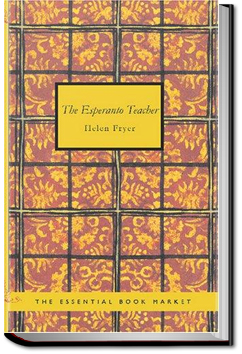

When we tell of someone doing a certain action we often want to allude to some circumstance concerning that action, such as the time, or place, or manner in which it was done, that is, when, or where, or how it was done.
In the sentences—Yesterday I met your son, Hieraŭ mi renkontis vian filon; He will go in the evening, Li iros vespere; They sat there, Ili sidis tie; She will remain at home, Ŝi restos hejme; Good children learn diligently, Bonaj infanoj lernas diligente; I will do it with pleasure, Mi faros ĝin plezure, the words hieraŭ, vespere, show the time, tie, hejme, show the place, and diligente, plezure, show the manner of the action.
(Because these words relate to the verb they are called Adverbs).
Adverbs may be formed from any word whose sense admits of it, and especially from adjectives, by means of the termination e, as bona, good, bone, well; antaŭ before, antaŭe, previously or formerly; mateno, morning, matene, in the morning; sekvi, to follow, sekve, consequently.
When we want the adverb to show "direction towards" any place, time, etc., either actually or figuratively, n is added, as Li alkuris hejmen, He ran home. Ili levis unu manon supren, They raised one hand upwards. Antaŭen! Forward! (n is also added to nouns to show direction towards. Li eniris en la domon, He entered into the house).
Some adverbs are used with adjectives and other adverbs to show the degree of the quality, quantity, etc., as The paper is very white, La papero estas tre blanka. Too much speaking tires hi
Get ALL YOU CAN BOOKS absolutely FREE for 30 days. Download our FREE app and enjoy unlimited downloads of our entire library with no restrictions.
Have immediate access and unlimited downloads to over 200,000 books, courses, podcasts, and more with no restrictions.
Everything you download during your trial is yours to keep and enjoy for free, even if you cancel during the trial. Cancel Anytime. No risk. No obligations.
For just $24.99 per month, you can continue to have unlimited access to our entire library. To put that into perspective, most other services charge the same amount for just one book!

As avid readers, we understand the joy of immersing ourselves in a captivating story or getting lost in the pages of a good book. That's why we founded All You Can Books back in 2010, to create a platform where people can access an extensive library of quality content and discover new favorites.
Since our founding days, we’ve continuously added to our vast library and currently have over 200,000 titles, including ebooks, audiobooks, language learning courses, podcasts, bestseller summaries, travel books, and more! Our goal at All You Can Books is to ensure we have something for everyone.
Join our community of book lovers and explore the world of literature and beyond!